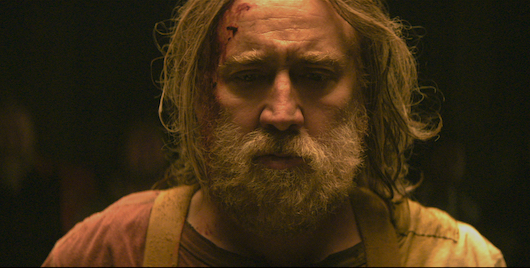“Some of the thematic material such as grief and loss in Pig as well as the concept of a man with a pet pig nagged at me for a long time,” declared writer/ director Michael Sarnoksi. He lost his father at a young age and Pig was his way of exploring how that loss wove its way into his life especially during his twenties. Michael thought about what sort of person he had become. “Pig is a story of how three different characters integrated grief into their lives.”
“I wrote a script that was very specific to me and somehow it managed to resonate with a lot of other people,” continued Sarnosky. “There’s something beautiful and personal gratifying about that.”
Vanessa Block who shares a story credit with Michael, as well as co-producing the film, expressed a more aerial view of the universality of Pig. “People are passing into something deeper than the specificity of relating to the loss a person. There are so many types of loss, particularly over the past two years during COVID-19.” Although many of us experienced physical loss during the pandemic, we also experienced the forced loss of human connection. The latter is evident in the character of Rob (Nicolas Cage), a hermit living in the wilderness with his truffle pig.
“I was struck by the specificity of the message. I never imagined that people would respond to the film with the appreciation, sensitivity, and enthusiasm as they did,” said Vanessa. “One of the reasons I think they did is that trauma loss is applicable to so many human experiences,” said Block. Rob isolated himself and built walls around those traumas. “Doing so is a necessary part of the healing process.”

Vanessa Block
A film about a man and his pig isn’t a gag although it is unconventional. It was an image embossed in Sarnoski’s mind that pestered him for years. A truffle pig is a unique animal that is rarely associated with being a pet, let alone grief. Block and Sarnoski confessed into leaning into the absurdity of the relationship between Rob and his pig rather than a cute and cuddly pet. On a deeper level, Sarnoski pondered the idea of “truffles are things we dig up from the dirt, but are also one of the most valuable culinary delicacies.” He also added, that what pigs lack in cuteness, they make up for in intelligence.
“There’s also a weird absurdity in the underground truffle industry that’s relatable,” Sarnoski continued. He also asks why a man can’t love his pig in the way others love their cats or dogs. “Pig highlights the unconventional places we find peace, connection and solace.”
The image of a man and his pig was a constant and was never going to be replaced with anything else from the first draft. Michael spent his writing process unpacking why he found that core image so poignant. “It was kind of intriguing, mysterious, etherial, and grounded,” mused Sarnoski. “In asking questions of why I was fixated on that image, I discovered where Rob came from and what the story was going to be.” Hence, Rob’s organic involvement in the culinary world.
After fleshing out Rob’s backstory, team Block and Sarnoski decided on the revenge thriller genre (sort of). “It not a traditional revenge film, but it follows some of the tropes of the noir thriller genre. Rather than existing in a world of violence, it exists in the culinary world,” pondered Sarnoski. “Instead of conceiving Pig as the best gun in the west, it was the best chef in Portland.” There was no shootout at the end. It opted for a quieter, gentler ending.
Pig doesn’t have a neat resolution at the end. It’s a plateau, a rest stop. It is about the journey of exploration rather than finding answers. “I don’t fully understand it, I just want to examine it,” elaborated Michael. “It’s about taking a part of yourself and putting it out there so you can shape into something that gives you a greater appreciation of it.”
Rob is healing himself by using his culinary passion to connect with other people. “We have to be true to ourselves and use that to communicate,” mused Michael. A big part of Rob’s journey is realizing that he doesn’t need to continue being alone in his grief anymore.
To Genre Or Not To Genre
Pig is arguably an adjacent revenge noir thriller according to the filmmakers. “Genre’s an inroad into the film which set up expectations that carry you through the story,” expanded Sarnoski. “Pig is a kind of cowboy movie about a master chef. This takes it in another direction.” They didn’t intend to subvert any genre. The subversion was a byproduct of their early creative decisions which helps the film.

Michael Sarnosky
“Honestly, if you try establish an anti-genre as a gimmick, you’re setting yourself up for failure,” declared Block. “Subverting an expectation with purpose sets up a tone of inauthenticity. This is never a good foundation of art.” Each layer of the film such as the locale and the music organically shifts the tone. “The character journey led the film to the genre and tone you see in the finished film,” concluded Block. She also added that Nicolas Cage markedly shaped the gentle and meditative tone and mood of the film. In some respects, Pig can be distilled to a low-key internalized drama.
Pig has been crudely compared to “John Wick with a pig,” so there were always going to be parallels drawn with similar films. Rather than butting antlers with these comparisons, they actually helped to position Pig according to Block and Sanorsky.
Building The World
Pig balances a world of gritty, realism with an elevated world of a chef’s relationship with a truffle pig. “Pig has many tonal shifts, but they are true to the same story. It has moments of comedy, violence, seriousness, and sadness.”
We approached the emotional story as realism and the physical story as elevated realism
The heightened moments are not meant to be taken too seriously. “There are elements of absurd elevated realism mixed with elements of harsh reality,” added Block. Portland, Oregon is a city that prides itself on “keeping itself weird.” This mantra infused itself into the story.

Brandy stars in Pig
“After my dad passed away, my life felt like a dream… like I was waiting to wake up from what had happened. It made me feel like an outsider looking into my own life,” said Michael. “The grief never went away. Instead, it quietly integrated itself into my life. It kind of lingers. Rob helped me explore my interactions with the world. He sees the world as absurd and can’t value it. The hyper-reality represents the strangeness Rob feels about the world.”
Rob’s Journey
The building blocks of Rob’s character were decided early on. At some point, the character became detached from Michael’s writing and took on a life of his own. “I don’t start with an outline of Rob’s entire philosophy on life. I have just enough understanding of the characters to explore them further as I write them. Nic Cage added his own layer of perception to Rob’s character.”
There’s a part where Rob’s convinced that a tidal wave will wash over Portland. It’s best not to intellectualize or judge it. Just accept that it’s something Rob might think. “Nic brought a weight, a depth, and a gravity to Rob,” said Vanessa. “Rob was driven into a state of solipsism by his grief,” added Michael. The idea of a reality outside his own mind and belief system tested this. As he tried to rescue his pig, he reconnected with his past and understood what he meant to others and what they meant to him. “He accessed a deeply hidden part of himself through his pig.”
Michael Sarnoski deconstructs his storytelling into writing and editing. Directing was the connective tissue between the two. “I often write as an editor so we’re clear and efficient about what we’re seeing on screen. I look at pacing and the entry and exit points of each scene. A screenplay is a blueprint, so I don’t want to spell things out too much to encourage the audience to intuit. I also try not to emotionally direct things too much in my writing.”
On a practical level, a writer’s voice is the lens through which they see the world and which moments they choose to tell their stories. “It’s how much we project our worldview onto things and how they affect each other,” Sarnosky added. It’s as much a process of which moments are included in the story as much as which ones are excluded.
Vanessa Block considers writing to be both “an exercise in extreme empathy and a seduction of the narcissist as you constantly access parts of yourself and your experiences. That’s tempered by the reality of inventing fully-formed characters that exist outside of yourself.” Block’s background in documentary filmmaking lends itself to the “removal of oneself” in depicting the lives of real people.
The construct of fictional screenwriting is to use truthful and honest building blocks in an untruthful foundation because you’re not capturing reality, only a representation of it. She defines a writer’s voice as what they do to access this truth. It is a constant search. It’s a process of bringing your full self to the page while simultaneously shedding it in order to write something meaningful.
